Newsletters
Share
Tweet
Email
Promoting Social Cohesion through Community Dialogue
Arigatou International - End Child Poverty in collaboration with the Uzalendo Afrika Initia- tive and Elim Fellowship Church, Nyali - Mombasa organised a community dialogue between 28th - 29th November; bringing together over 50 diverse participants/stake- holders in the community. They included; youth, women, religious leaders and govern- ment officials. Community dialogues is a critical lifeline to promoting peace as they provide the perfect avenues for partnerships between different actors within the community.
Promoting Social Cohesion through Community Dialogue
Arigatou International - End Child Poverty in collaboration with the Uzalendo Afrika Initia- tive and Elim Fellowship Church, Nyali - Mombasa organised a community dialogue between 28th - 29th November; bringing together over 50 diverse participants/stake- holders in the community. They included; youth, women, religious leaders and govern- ment officials. Community dialogues is a critical lifeline to promoting peace as they provide the perfect avenues for partnerships between different actors within the community.
Promoting Social Cohesion through Community Dialogue
Arigatou International - End Child Poverty in collaboration with the Uzalendo Afrika Initia- tive and Elim Fellowship Church, Nyali - Mombasa organised a community dialogue between 28th - 29th November; bringing together over 50 diverse participants/stake- holders in the community. They included; youth, women, religious leaders and govern- ment officials. Community dialogues is a critical lifeline to promoting peace as they provide the perfect avenues for partnerships between different actors within the community.
Youth Leading Peace in South Sudan
Regional Peace Programme
The Catalyst Youth Network has been a true challenge and testimony that peace must be built from the bottom (grassroots) going up, in order for it to be sustainable and enable community ownership. Since November 2021 when the South Sudan Youth Catalyst Network was initiated, we have witnessed young people leading dialogue within communities with positive response from the community demonstrating that peace is a collective good in South Sudan.
The Catalyst Youth Network has been a true challenge and testimony that peace must be built from the bottom (grassroots) going up, in order for it to be sustainable and enable community ownership. Since November 2021 when the South Sudan Youth Catalyst Network was initiated, we have witnessed young people leading dialogue within communities with positive response from the community demonstrating that peace is a collective good in South Sudan.
The Catalyst Youth Network has been a true challenge and testimony that peace must be built from the bottom (grassroots) going up, in order for it to be sustainable and enable community ownership. Since November 2021 when the South Sudan Youth Catalyst Network was initiated, we have witnessed young people leading dialogue within communities with positive response from the community demonstrating that peace is a collective good in South Sudan.
Faith Actors Promoting Social Cohesion – Regional Faith Leaders Forum
Regional Faith Leaders Forum - 2022
First held virtually in 2020, this year’s forum happened in-person in Nairobi Kenya, from 23 - 27 May, bringing togeth- er 27 diverse faith leaders. The week-long forum themed Faith Actors Promoting Social Cohesion and FoRB focused on enhancing faith leaders’ understanding of FoRB while identifying challenges towards promoting FoRB in the region. The forum further provided a platform for the faith leaders to reflect on the best practices towards promotion of FoRB in the region.
Faith Actors Promoting Social Cohesion – Regional Faith Leaders Forum
Regional Faith Leaders Forum - 2022
First held virtually in 2020, this year’s forum happened in-person in Nairobi Kenya, from 23 - 27 May, bringing togeth- er 27 diverse faith leaders. The week-long forum themed Faith Actors Promoting Social Cohesion and FoRB focused on enhancing faith leaders’ understanding of FoRB while identifying challenges towards promoting FoRB in the region. The forum further provided a platform for the faith leaders to reflect on the best practices towards promotion of FoRB in the region.
Faith Actors Promoting Social Cohesion – Regional Faith Leaders Forum
Regional Faith Leaders Forum - 2022
First held virtually in 2020, this year’s forum happened in-person in Nairobi Kenya, from 23 - 27 May, bringing togeth- er 27 diverse faith leaders. The week-long forum themed Faith Actors Promoting Social Cohesion and FoRB focused on enhancing faith leaders’ understanding of FoRB while identifying challenges towards promoting FoRB in the region. The forum further provided a platform for the faith leaders to reflect on the best practices towards promotion of FoRB in the region.
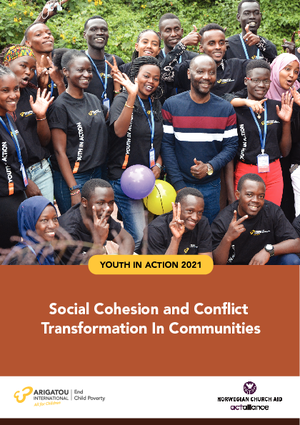
Social Cohesion and Conflict Transformation In Communities: Youth In Action 2021
Drawn from the Eastern Africa and Africa Great Lakes Region, 27 young leaders from diverse cultural and religious backgrounds, gathered in Kenya with one objective - promoting peace in the region.
Social Cohesion and Conflict Transformation In Communities: Youth In Action 2021
Drawn from the Eastern Africa and Africa Great Lakes Region, 27 young leaders from diverse cultural and religious backgrounds, gathered in Kenya with one objective - promoting peace in the region.
Social Cohesion and Conflict Transformation In Communities: Youth In Action 2021
Drawn from the Eastern Africa and Africa Great Lakes Region, 27 young leaders from diverse cultural and religious backgrounds, gathered in Kenya with one objective - promoting peace in the region.
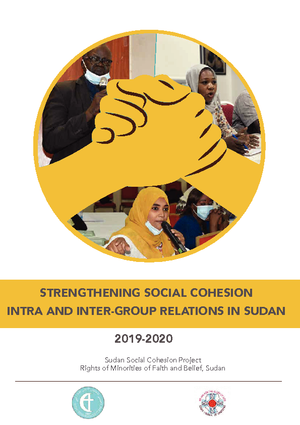
Strengthening Social Cohesion Intra and Inter-Group Relations in Sudan
Trainings on FORB provided the impetus and practical knowledge that would be useful in promoting social cohesion and FoRB through out the project. To this end SSCP facilitated 15 trainings with a robust reach of participants. The implementing partners and their constituencies were trained on how to promote social cohesion, human rights, FoRB, community dialogue facilitation, interfaith dialogue, peacebuilding and advocacy skills. In addition, women and youth from those sites were equipped with entrepreneurship and livelihood skills. These trainings reached a broad base of target groups ranging from faith actors, government representatives, CSOs, men, women, youth, children workers, teachers from Christian and Islamic traditions.
Strengthening Social Cohesion Intra and Inter-Group Relations in Sudan
Trainings on FORB provided the impetus and practical knowledge that would be useful in promoting social cohesion and FoRB through out the project. To this end SSCP facilitated 15 trainings with a robust reach of participants. The implementing partners and their constituencies were trained on how to promote social cohesion, human rights, FoRB, community dialogue facilitation, interfaith dialogue, peacebuilding and advocacy skills. In addition, women and youth from those sites were equipped with entrepreneurship and livelihood skills. These trainings reached a broad base of target groups ranging from faith actors, government representatives, CSOs, men, women, youth, children workers, teachers from Christian and Islamic traditions.
Strengthening Social Cohesion Intra and Inter-Group Relations in Sudan
Trainings on FORB provided the impetus and practical knowledge that would be useful in promoting social cohesion and FoRB through out the project. To this end SSCP facilitated 15 trainings with a robust reach of participants. The implementing partners and their constituencies were trained on how to promote social cohesion, human rights, FoRB, community dialogue facilitation, interfaith dialogue, peacebuilding and advocacy skills. In addition, women and youth from those sites were equipped with entrepreneurship and livelihood skills. These trainings reached a broad base of target groups ranging from faith actors, government representatives, CSOs, men, women, youth, children workers, teachers from Christian and Islamic traditions.
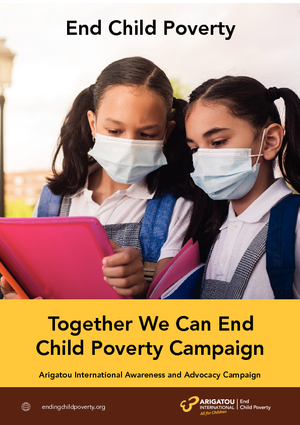
IDEP Report 2020
As with each year, ‘Together we can end child poverty’ campaign not only provides us an opportunity to join the world in marking IDEP but also grants us space to intensify our work in creating awareness, building advocacy and rallying partners to take action against child poverty. In 2020, the campaign was anchored on the global theme; ‘Acting together to achieve social and environmental justice for all’
Together we can end child poverty campaign was designed with this theme in mind with a bias on children. Our approach was based on the premise that social and environmental justice is key to ending child poverty as it addresses the underlying structural root causes of poverty including: corruption, gender inequalities, climate change, racial discrimination and racism, restrictions of Freedom of Religion or Belief (FoRB) and violence against children.
IDEP Report 2020
As with each year, ‘Together we can end child poverty’ campaign not only provides us an opportunity to join the world in marking IDEP but also grants us space to intensify our work in creating awareness, building advocacy and rallying partners to take action against child poverty. In 2020, the campaign was anchored on the global theme; ‘Acting together to achieve social and environmental justice for all’
Together we can end child poverty campaign was designed with this theme in mind with a bias on children. Our approach was based on the premise that social and environmental justice is key to ending child poverty as it addresses the underlying structural root causes of poverty including: corruption, gender inequalities, climate change, racial discrimination and racism, restrictions of Freedom of Religion or Belief (FoRB) and violence against children.
IDEP Report 2020
As with each year, ‘Together we can end child poverty’ campaign not only provides us an opportunity to join the world in marking IDEP but also grants us space to intensify our work in creating awareness, building advocacy and rallying partners to take action against child poverty. In 2020, the campaign was anchored on the global theme; ‘Acting together to achieve social and environmental justice for all’
Together we can end child poverty campaign was designed with this theme in mind with a bias on children. Our approach was based on the premise that social and environmental justice is key to ending child poverty as it addresses the underlying structural root causes of poverty including: corruption, gender inequalities, climate change, racial discrimination and racism, restrictions of Freedom of Religion or Belief (FoRB) and violence against children.
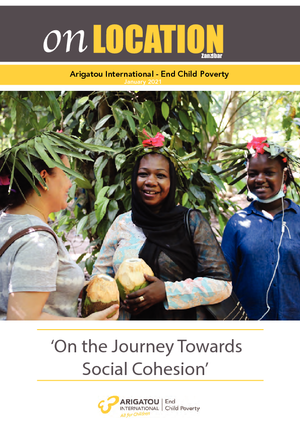
On Location – Zanzibar
In December 2020, Sudan Council of Churches (SCC) and Sudan Interreligious Council (SIRC) visited Zanzibar to discuss and reflect on practical models of community interaction aimed at building successful coexistence between people of different ethnic and religious groups. This event was facilitated by Arigatou International - Nairobi and hosted by Zanzibar Interfaith Centre (ZANZIC). View the PDF to learn more!
On Location – Zanzibar
In December 2020, Sudan Council of Churches (SCC) and Sudan Interreligious Council (SIRC) visited Zanzibar to discuss and reflect on practical models of community interaction aimed at building successful coexistence between people of different ethnic and religious groups. This event was facilitated by Arigatou International - Nairobi and hosted by Zanzibar Interfaith Centre (ZANZIC). View the PDF to learn more!
On Location – Zanzibar
In December 2020, Sudan Council of Churches (SCC) and Sudan Interreligious Council (SIRC) visited Zanzibar to discuss and reflect on practical models of community interaction aimed at building successful coexistence between people of different ethnic and religious groups. This event was facilitated by Arigatou International - Nairobi and hosted by Zanzibar Interfaith Centre (ZANZIC). View the PDF to learn more!
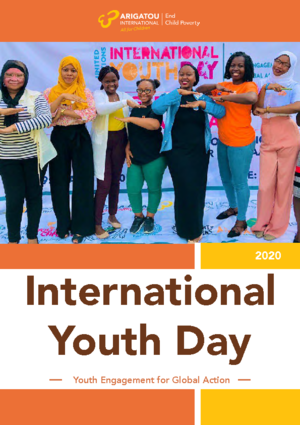
International Youth Day 2020
Globally, the International Youth Day (IYD), marked every 12th August, is not only meant to honor youth around the globe but also take stock of the crucial contribution of the youth to the global economy and development, replicated in the way youth around the world support their communities in achieving much needed progress in varied sectors. The day also highlights the challenges youths encounter around the world including issues of unemployment, non-inclusion in policy making processes and programs and the effect of unstable and violent conflict affected societies. In marking this year’s International Youth Day with the theme – Youth Engagement for Global Action, Arigatou International — End Child Poverty demonstrated how to meaningfully engage the youth in building better world for children, to achieve local, national and global action. Specifically, it partnered and supported important youth activities in Africa organized and coordinated by Youth In Action (regional networks established and supported by End Child Poverty and other partnering organisations) and the African Children and Youth Network for Human Rights /Réseau des Enfants et Jeunes Africains pour les Droits Humains (REJADH). These youths led various processes, activities and events in their communities within the thematic areas of peacebuilding, gender equality, ending poverty, while relating them to the IYD’s theme.
International Youth Day 2020
Globally, the International Youth Day (IYD), marked every 12th August, is not only meant to honor youth around the globe but also take stock of the crucial contribution of the youth to the global economy and development, replicated in the way youth around the world support their communities in achieving much needed progress in varied sectors. The day also highlights the challenges youths encounter around the world including issues of unemployment, non-inclusion in policy making processes and programs and the effect of unstable and violent conflict affected societies. In marking this year’s International Youth Day with the theme – Youth Engagement for Global Action, Arigatou International — End Child Poverty demonstrated how to meaningfully engage the youth in building better world for children, to achieve local, national and global action. Specifically, it partnered and supported important youth activities in Africa organized and coordinated by Youth In Action (regional networks established and supported by End Child Poverty and other partnering organisations) and the African Children and Youth Network for Human Rights /Réseau des Enfants et Jeunes Africains pour les Droits Humains (REJADH). These youths led various processes, activities and events in their communities within the thematic areas of peacebuilding, gender equality, ending poverty, while relating them to the IYD’s theme.
International Youth Day 2020
Globally, the International Youth Day (IYD), marked every 12th August, is not only meant to honor youth around the globe but also take stock of the crucial contribution of the youth to the global economy and development, replicated in the way youth around the world support their communities in achieving much needed progress in varied sectors. The day also highlights the challenges youths encounter around the world including issues of unemployment, non-inclusion in policy making processes and programs and the effect of unstable and violent conflict affected societies. In marking this year’s International Youth Day with the theme – Youth Engagement for Global Action, Arigatou International — End Child Poverty demonstrated how to meaningfully engage the youth in building better world for children, to achieve local, national and global action. Specifically, it partnered and supported important youth activities in Africa organized and coordinated by Youth In Action (regional networks established and supported by End Child Poverty and other partnering organisations) and the African Children and Youth Network for Human Rights /Réseau des Enfants et Jeunes Africains pour les Droits Humains (REJADH). These youths led various processes, activities and events in their communities within the thematic areas of peacebuilding, gender equality, ending poverty, while relating them to the IYD’s theme.
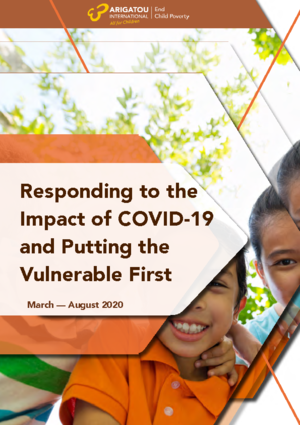
Responding to the Impact of COVID-19 and Putting the Vulnerable First
The COVID-19 pandemic’s economic fallout could push up to 86 million more children into household poverty by the end of 2020, according to UNICEF. The pandemic’s massive socioeconomic effect has also exposed and widened the already existing and persistent inequalities among people and countries. The International Labour Organization on the other hand estimates that half of working people could lose their jobs in 2020 and the pandemic could cost the global economy US$10 trillion. These grave effects of the pandemic will mostly affect directly vulnerable groups, most of who are people that rely on the informal economy, women, children, migrants, refugees, and forcibly displaced persons and more generally, low-income households. These group face greater challenges in accessing services such as health, education, and housing and sanitation infrastructure and the disparities in access will be exacer- bated by the COVID-19 pandemic. Our work at End Child Poverty towards responding to the COVID-19 pandemic has been well aligned and cognizant of these vulnerable populations, especially children. Since March 2020, we joined fellow initiatives of Arigatou International in instituting the collective ‘Faith in Action for Children’ campaign that would rally religious leaders and religious communities to increase their actions in response to the impact of the COVID-19 pandemic on children.
Responding to the Impact of COVID-19 and Putting the Vulnerable First
The COVID-19 pandemic’s economic fallout could push up to 86 million more children into household poverty by the end of 2020, according to UNICEF. The pandemic’s massive socioeconomic effect has also exposed and widened the already existing and persistent inequalities among people and countries. The International Labour Organization on the other hand estimates that half of working people could lose their jobs in 2020 and the pandemic could cost the global economy US$10 trillion. These grave effects of the pandemic will mostly affect directly vulnerable groups, most of who are people that rely on the informal economy, women, children, migrants, refugees, and forcibly displaced persons and more generally, low-income households. These group face greater challenges in accessing services such as health, education, and housing and sanitation infrastructure and the disparities in access will be exacer- bated by the COVID-19 pandemic. Our work at End Child Poverty towards responding to the COVID-19 pandemic has been well aligned and cognizant of these vulnerable populations, especially children. Since March 2020, we joined fellow initiatives of Arigatou International in instituting the collective ‘Faith in Action for Children’ campaign that would rally religious leaders and religious communities to increase their actions in response to the impact of the COVID-19 pandemic on children.
Responding to the Impact of COVID-19 and Putting the Vulnerable First
The COVID-19 pandemic’s economic fallout could push up to 86 million more children into household poverty by the end of 2020, according to UNICEF. The pandemic’s massive socioeconomic effect has also exposed and widened the already existing and persistent inequalities among people and countries. The International Labour Organization on the other hand estimates that half of working people could lose their jobs in 2020 and the pandemic could cost the global economy US$10 trillion. These grave effects of the pandemic will mostly affect directly vulnerable groups, most of who are people that rely on the informal economy, women, children, migrants, refugees, and forcibly displaced persons and more generally, low-income households. These group face greater challenges in accessing services such as health, education, and housing and sanitation infrastructure and the disparities in access will be exacer- bated by the COVID-19 pandemic. Our work at End Child Poverty towards responding to the COVID-19 pandemic has been well aligned and cognizant of these vulnerable populations, especially children. Since March 2020, we joined fellow initiatives of Arigatou International in instituting the collective ‘Faith in Action for Children’ campaign that would rally religious leaders and religious communities to increase their actions in response to the impact of the COVID-19 pandemic on children.
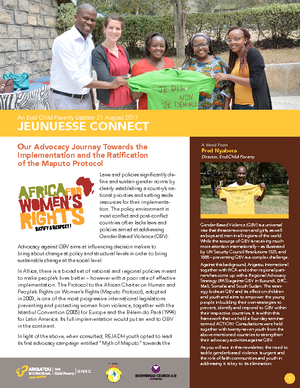
Jeunesse Connect Issue 2
Gender-Based Violence (GBV) is a universal vise that threatens women and girls, as well as boys and men in all regions of the world. While the scourge of GBV is receiving much more attention internationally – as illustrated by UN Security Council Resolutions 1325, and 1888 – preventing GBV is a complex challenge. Against this background, Arigatou International together with NCA and other regional partners has come up with a Regional Advocacy Strategy (RAS) against GBV in Burundi, DRC, Mali, Somalia and South Sudan. The strategy looks at GBV and its effect on children and youth and aims to empower the young people in building their own strategies to prevent, identify and respond to GBV within their respective countries. It is within this framework that we held a four-day seminar termed ACTION! Consultations were held together with twenty-seven youth from the above-mentioned countries to strengthen their advocacy activities against GBV.
Jeunesse Connect Issue 2
Gender-Based Violence (GBV) is a universal vise that threatens women and girls, as well as boys and men in all regions of the world. While the scourge of GBV is receiving much more attention internationally – as illustrated by UN Security Council Resolutions 1325, and 1888 – preventing GBV is a complex challenge. Against this background, Arigatou International together with NCA and other regional partners has come up with a Regional Advocacy Strategy (RAS) against GBV in Burundi, DRC, Mali, Somalia and South Sudan. The strategy looks at GBV and its effect on children and youth and aims to empower the young people in building their own strategies to prevent, identify and respond to GBV within their respective countries. It is within this framework that we held a four-day seminar termed ACTION! Consultations were held together with twenty-seven youth from the above-mentioned countries to strengthen their advocacy activities against GBV.
Jeunesse Connect Issue 2
Gender-Based Violence (GBV) is a universal vise that threatens women and girls, as well as boys and men in all regions of the world. While the scourge of GBV is receiving much more attention internationally – as illustrated by UN Security Council Resolutions 1325, and 1888 – preventing GBV is a complex challenge. Against this background, Arigatou International together with NCA and other regional partners has come up with a Regional Advocacy Strategy (RAS) against GBV in Burundi, DRC, Mali, Somalia and South Sudan. The strategy looks at GBV and its effect on children and youth and aims to empower the young people in building their own strategies to prevent, identify and respond to GBV within their respective countries. It is within this framework that we held a four-day seminar termed ACTION! Consultations were held together with twenty-seven youth from the above-mentioned countries to strengthen their advocacy activities against GBV.
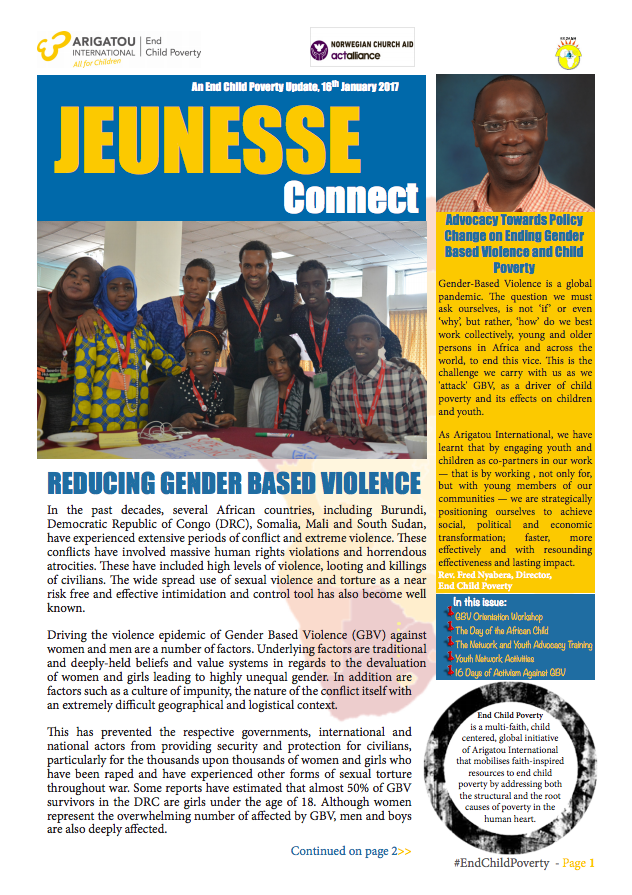
Jeunesse Connect Issue 1
Gender Based Violence remains a major issue all around the world exacerbated in conflict and post-conflict settings where sexual violence is used as a war weapon and where violence encourages the perpetration of gender-based violence within all components of the society, including homes, schools, workplace, etc. This newsletter publication mainly features the activities of the African Youth and Children Network for Human Rights (YCNR) (Réseau des Enfants et Jeunes Africains pour les Droits Humains (REJADH), a Youth of faith network that Arigatou International has brought together with the help of Norwegian Church Aid to address issues of Gender Based Violence in conflict and post conflict countries and how they negatively impact on children (Countries of focus - Burundi, Mali, Democratic Republic of Congo, Somalia and South Sudan).
Jeunesse Connect Issue 1
Gender Based Violence remains a major issue all around the world exacerbated in conflict and post-conflict settings where sexual violence is used as a war weapon and where violence encourages the perpetration of gender-based violence within all components of the society, including homes, schools, workplace, etc. This newsletter publication mainly features the activities of the African Youth and Children Network for Human Rights (YCNR) (Réseau des Enfants et Jeunes Africains pour les Droits Humains (REJADH), a Youth of faith network that Arigatou International has brought together with the help of Norwegian Church Aid to address issues of Gender Based Violence in conflict and post conflict countries and how they negatively impact on children (Countries of focus - Burundi, Mali, Democratic Republic of Congo, Somalia and South Sudan).
Jeunesse Connect Issue 1
Gender Based Violence remains a major issue all around the world exacerbated in conflict and post-conflict settings where sexual violence is used as a war weapon and where violence encourages the perpetration of gender-based violence within all components of the society, including homes, schools, workplace, etc. This newsletter publication mainly features the activities of the African Youth and Children Network for Human Rights (YCNR) (Réseau des Enfants et Jeunes Africains pour les Droits Humains (REJADH), a Youth of faith network that Arigatou International has brought together with the help of Norwegian Church Aid to address issues of Gender Based Violence in conflict and post conflict countries and how they negatively impact on children (Countries of focus - Burundi, Mali, Democratic Republic of Congo, Somalia and South Sudan).
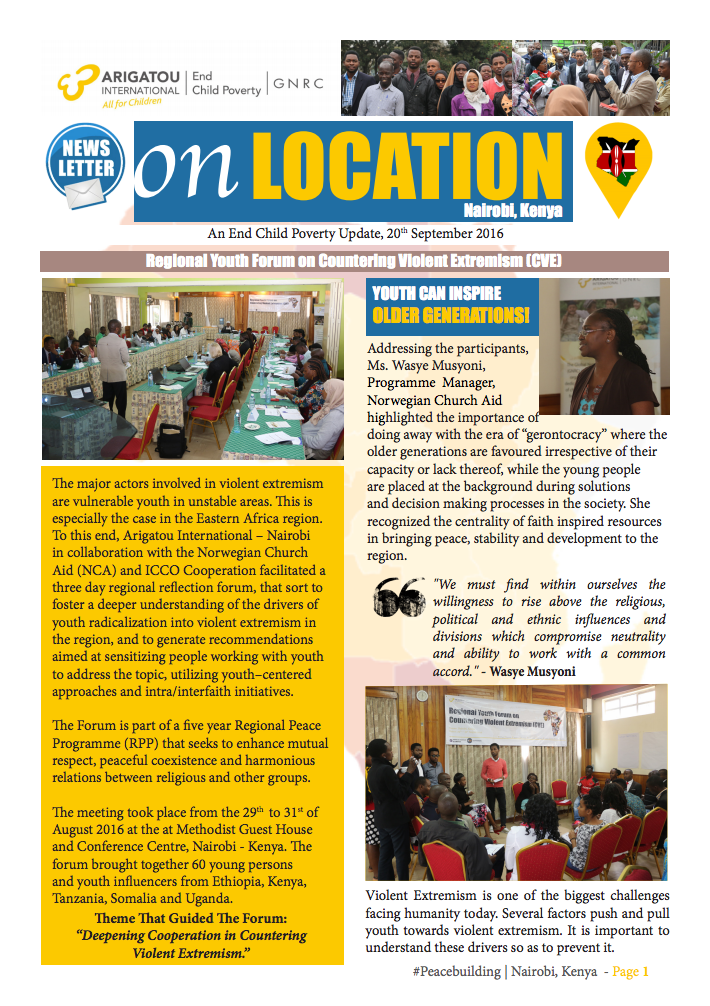
Regional Youth Peace Building Forum
The major actors involved in violent extremism are vulnerable youth in unstable areas. This is especially the case in the Eastern Africa region. In this regard, Arigatou International – Nairobi in collaboration with the Norwegian Church Aid (NCA) and ICCO Cooperation facilitated a three day regional reflection forum with the theme "Deepening Cooperation in Countering Violent Extremism." It sought to foster a deeper understanding of the drivers of youth radicalization into violent extremism in the region, and to generate recommendations aimed at sensitizing people working with youth to address the topic. Youth–centered approaches and intra/interfaith initiatives were utilized to enhance mutual respect, peaceful coexistence and harmonious relations between religious and other groups.
Regional Youth Peace Building Forum
The major actors involved in violent extremism are vulnerable youth in unstable areas. This is especially the case in the Eastern Africa region. In this regard, Arigatou International – Nairobi in collaboration with the Norwegian Church Aid (NCA) and ICCO Cooperation facilitated a three day regional reflection forum with the theme "Deepening Cooperation in Countering Violent Extremism." It sought to foster a deeper understanding of the drivers of youth radicalization into violent extremism in the region, and to generate recommendations aimed at sensitizing people working with youth to address the topic. Youth–centered approaches and intra/interfaith initiatives were utilized to enhance mutual respect, peaceful coexistence and harmonious relations between religious and other groups.
Regional Youth Peace Building Forum
The major actors involved in violent extremism are vulnerable youth in unstable areas. This is especially the case in the Eastern Africa region. In this regard, Arigatou International – Nairobi in collaboration with the Norwegian Church Aid (NCA) and ICCO Cooperation facilitated a three day regional reflection forum with the theme "Deepening Cooperation in Countering Violent Extremism." It sought to foster a deeper understanding of the drivers of youth radicalization into violent extremism in the region, and to generate recommendations aimed at sensitizing people working with youth to address the topic. Youth–centered approaches and intra/interfaith initiatives were utilized to enhance mutual respect, peaceful coexistence and harmonious relations between religious and other groups.
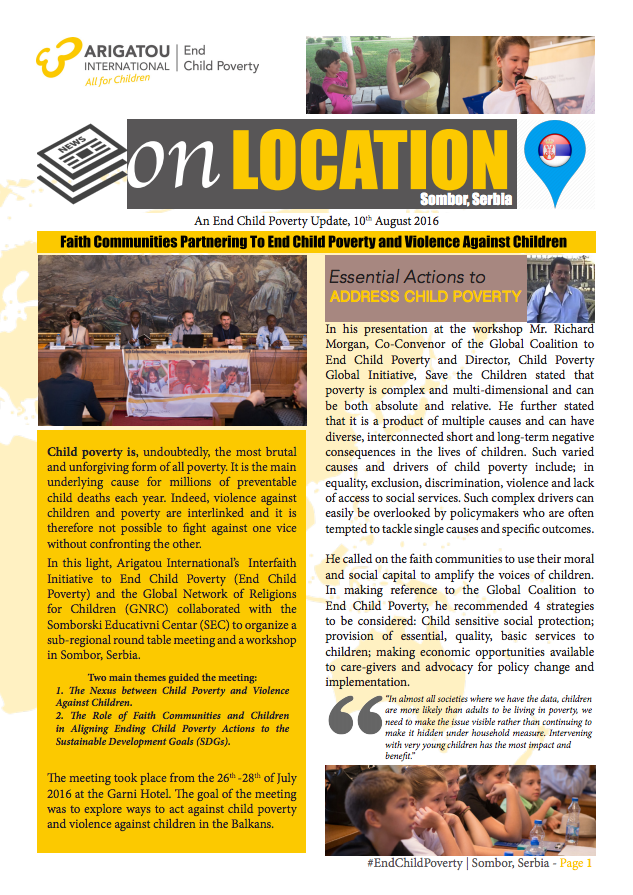
Ending Child Poverty and Violence Against Children Sombor – Serbia
Addressing challenges of Child Poverty and Violence Against Children, while simultaneously providing new sustainable pathways, the 3 days’ Workshop and Round-Table facilitated by Arigatou international - Nairobi In collaboration with the Somborski Edukativni Centar (SEC), highlighted ways that children experience poverty and the patterns of poverty across the Balkans as well as the common drivers of poverty and violence against the children.
Ending Child Poverty and Violence Against Children Sombor – Serbia
Addressing challenges of Child Poverty and Violence Against Children, while simultaneously providing new sustainable pathways, the 3 days’ Workshop and Round-Table facilitated by Arigatou international - Nairobi In collaboration with the Somborski Edukativni Centar (SEC), highlighted ways that children experience poverty and the patterns of poverty across the Balkans as well as the common drivers of poverty and violence against the children.
Ending Child Poverty and Violence Against Children Sombor – Serbia
Addressing challenges of Child Poverty and Violence Against Children, while simultaneously providing new sustainable pathways, the 3 days’ Workshop and Round-Table facilitated by Arigatou international - Nairobi In collaboration with the Somborski Edukativni Centar (SEC), highlighted ways that children experience poverty and the patterns of poverty across the Balkans as well as the common drivers of poverty and violence against the children.
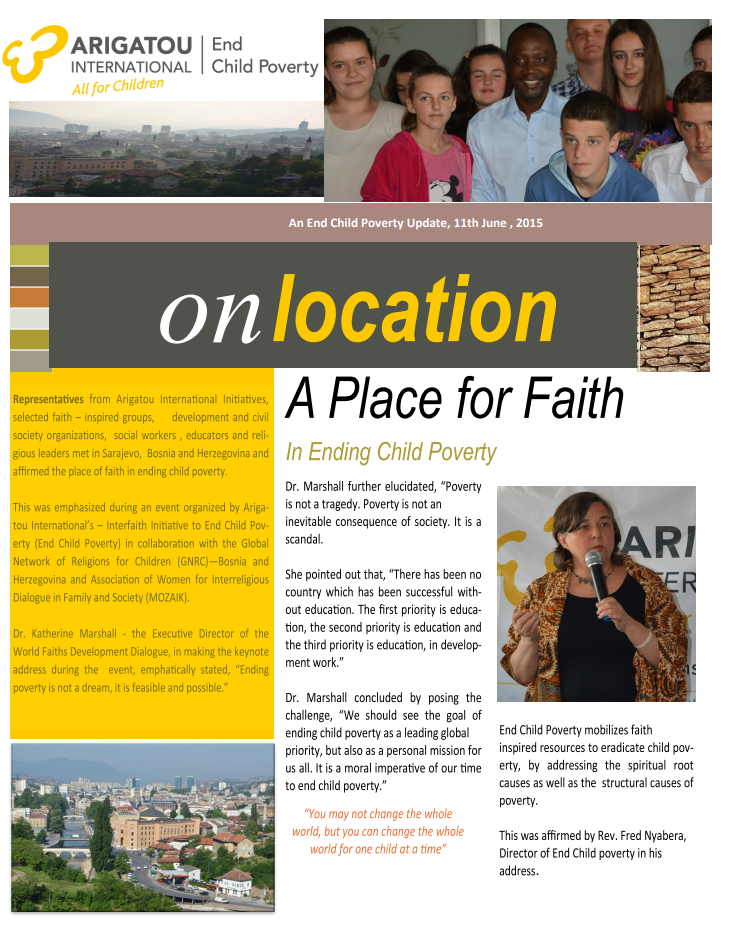
A Place of Faith in Ending Child Poverty
Set against the backdrop of a country healing from violent conflict and working toward economic recovery, the theme of “Affirming the Place of Faith in Ending Child Poverty” was both timely and a call to practical action.
A Place of Faith in Ending Child Poverty
Set against the backdrop of a country healing from violent conflict and working toward economic recovery, the theme of “Affirming the Place of Faith in Ending Child Poverty” was both timely and a call to practical action.
A Place of Faith in Ending Child Poverty
Set against the backdrop of a country healing from violent conflict and working toward economic recovery, the theme of “Affirming the Place of Faith in Ending Child Poverty” was both timely and a call to practical action.